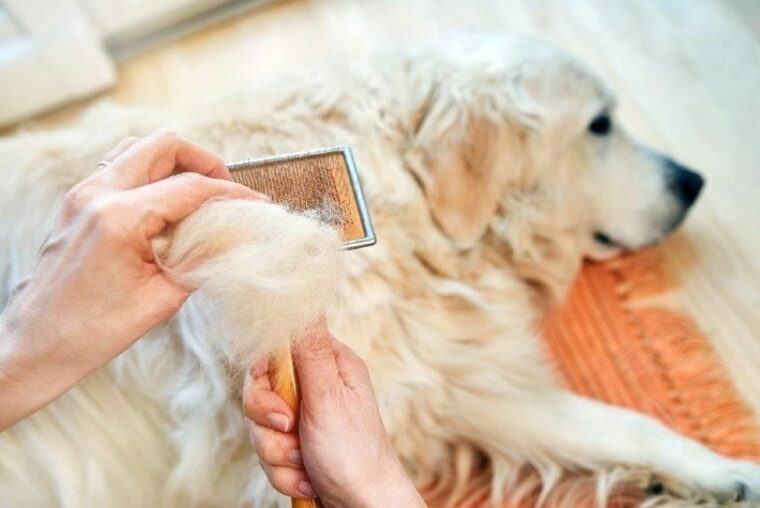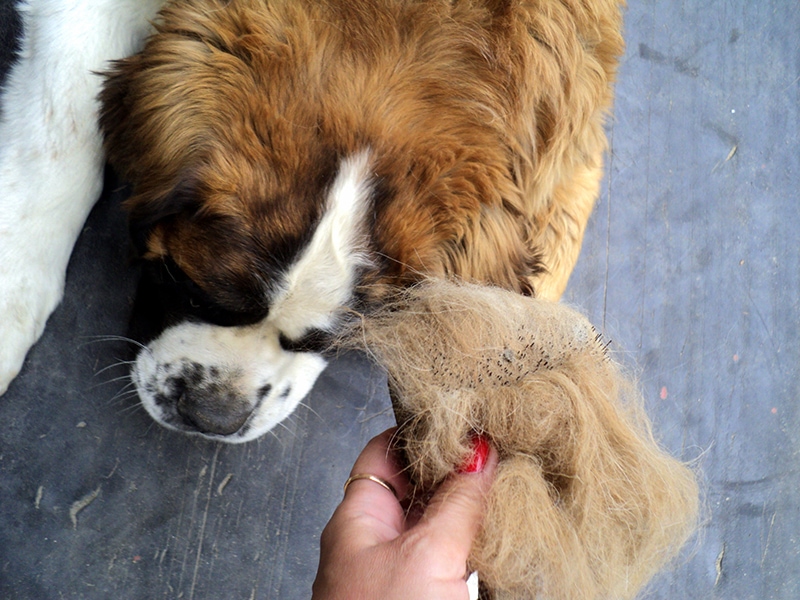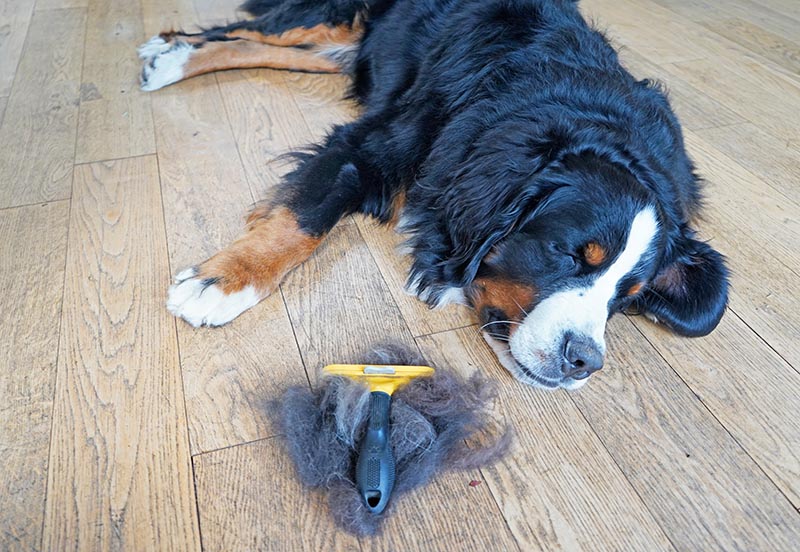
Click to Skip Ahead
All dog owners expect some shedding, but it can be challenging to tell when your shaggy Golden Retriever is going through a rough shedding season or when it’s alopecia, which is the medical term for excessive hair loss.
Depending on its cause, hair loss in dogs can present with all sorts of alarming signs. Sometimes, it’s nothing to be worried about, but other times, it can signify a serious health problem. If your pet is suffering from hair loss we recommend a consultation with your veterinarian.
Let’s briefly break down some of the more common causes just below, and tips on controlling hair loss further down.
The 7 Possible Reasons Your Dog Is Losing Hair
1. Allergies
Just like some people, some dogs have allergies meaning their immune system reacts to allergens such as pollen, dust mites, some foods etc. Dogs with allergies can develop itching and very angry red rashes, which can trigger frantic scratching and fur pulling. Allergies typically develop in young adult dogs although they can be seen at any age. Your dog may be allergic to seasonal pollens, plants, flea saliva, beef or chicken amongst other possibilities. Visit with your veterinarian for advice and treatment options.
2. Hormonal Disease
Hormonal conditions like Cushing’s disease and hypothyroidism can cause balding, especially in older dogs, and are usually accompanied by fatigue, panting, drinking more than usual and weight gain. Your dog’s vet will be able to diagnose these conditions by doing blood work, and they’ll be able to advise you on the next steps.

3. Parasites
Mites and fleas can infest your dog and cause skin-level signs like fur loss, skin rashes, and other dermal abnormalities. Your dog may have scratched the site raw, too, if they’re a prolific lick-and-scratcher, which can further inflame the affected area. Hair loss in these cases is typically temporary, and it will likely grow back over time, once the parasites have been effectively treated.
4. Infection
Bacteria that get into cuts or scrapes on your dog’s skin can fester into gnarly skin infections, producing flaking, crusty, scabs, redness, and hair loss. Ringworm is a fungal infection that also causes hair loss and irritation, typically in circular patches. Your veterinarian will prescribe oral or topical medication to combat infections.
5. More Serious Skin Conditions
Autoimmune and cancerous conditions of the skin are thankfully less common than other causes of hair loss. They are normally diagnosed through a biopsy. Your veterinarian will advise if they think a skin biopsy is necessary for your pet.

6. Genetics
Genetic or breed-related hair loss occurs in some breeds such as the Greyhound and Pomeranians. Color dilution alopecia occurs in “blue” coloured individuals in many breeds. This type of hair loss is not harmful to your dog but needs a vet to rule out other problems.
7. Calluses
Calluses are thickened areas of skin which develop when a heavier, older, and/or bonier dog regularly puts a lot of their body weight on a certain body area, normally on the elbows. For instance, lying on a hard tile floor for prolonged periods every day can contribute to developing calluses.
To remedy this, we recommend investing in a nice comfy dog bed for your dog to sleep in instead of on hard surfaces although they may prefer not to use it. Calluses are nothing to worry about unless they progress into open wounds which generally only happens in sick, old or poorly-mobile animals

How to Control Hair Loss in Your Dog
When you’re at your wit’s end on how to deal with hair loss, it can be very stressful. Hair loss is usually a medical problem and without veterinary guidance it is unlikely to resolve on its own.
Giving your pet a bath can be a difficult task, but the first step is to choose a great shampoo. We love Hepper's Shampoo Products, both of which are natural, pet-safe options specially formulated to clean your pet's skin and coat without causing irritation. Both formulas are also free of things like dyes, soaps, sulfates, and phthalates. Your pet will enjoy the soothing aloe vera and oatmeal, and you'll love the clean, fresh scents!
Hepper Colloidal Oatmeal Pet Shampoo
Hepper Waterless No Rinse Pet Shampoo
Natural Ingredients
Made in USA
Safe for cats & dogs
Soothes dry skin
Waterless, no rinsing required
At Pet Keen, we've admired Hepper for many years, and decided to take a controlling ownership interest so that we could benefit from the outstanding designs of this cool cat company!
Conclusion
When your dog is losing hair, it is always worth a visit to the veterinarian to get to the bottom of it. You will have peace of mind once your pet has been looked at and treated by a professional. Hair loss is a common sign but it can be caused by a multitude of problems. Hence needing a visit, or several to the vet.
Featured Image Credit: sonsart, Shutterstock









